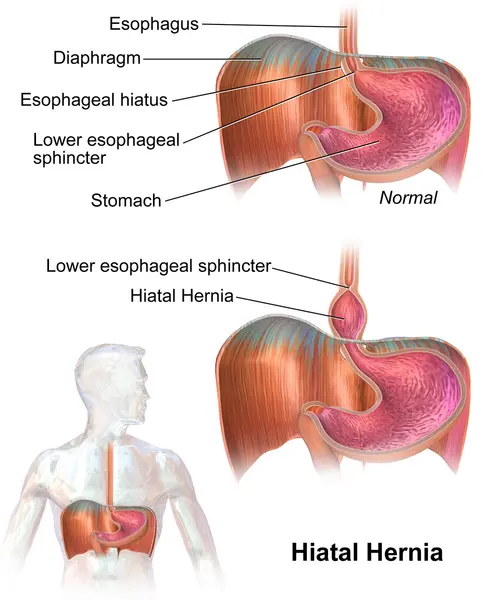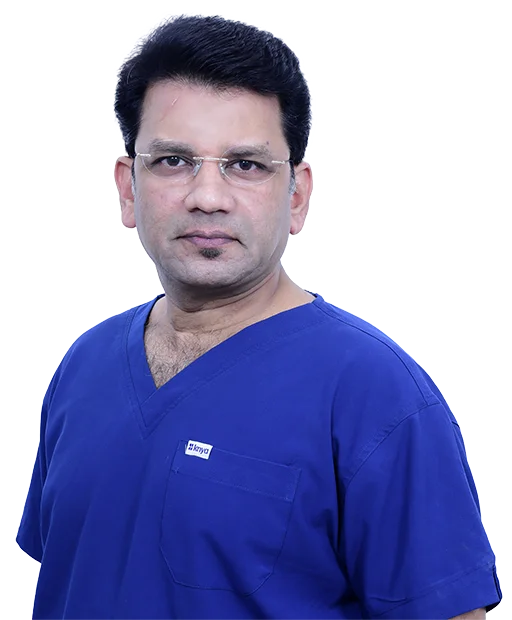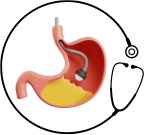Hiatus Hernia Surgery
Relief from Reflux, Bloating & Chest Discomfort — With Expert Surgical Care
Symptoms of Hiatus Hernia
- While small hernias may go unnoticed, larger ones can cause:
- Acid reflux (GERD)
- Heartburn
- Difficulty swallowing
- Chest discomfort
- Bloating or frequent belching
What is Hiatus Hernia and Why It Happens?
A hiatus hernia is a condition in which the upper part of the stomach pushes upward through the diaphragm – the muscle that separates the chest cavity from the abdomen – via a small natural opening called the hiatus. Normally, the stomach stays below the diaphragm, but in this condition, it slips through the hiatus into the chest area. This can occur due to various reasons, such as age-related muscle weakness, increased abdominal pressure from obesity, chronic coughing, constipation with straining, heavy lifting, or pregnancy. In some individuals, it may also be genetically predisposed. While small hiatus hernias may not cause any noticeable symptoms, larger ones often lead to acid reflux, heartburn, difficulty swallowing, bloating, or a feeling of pressure in the chest. Over time, the acid reflux caused by a hernia can also damage the esophagus. The good news is that with early diagnosis and proper treatment, this condition is manageable.
हायटस हर्निया क्या है और यह क्यों होता है?
एसिड रिफ्लक्स, जिसे गैस्ट्रोईसोफेगल रिफ्लक्स डिजीज (GERD) भी कहा जाता है, तब होता है जब पेट का अम्ल वापस भोजन नली (इसोफेगस) में चला जाता है। इससे सीने में जलन जैसी तकलीफ होती है, जिसे हार्टबर्न कहा जाता है। यह समस्या तब होती है जब पेट और भोजन नली के बीच की मांसपेशियों की रिंग (Lower Esophageal Sphincter – LES) कमजोर हो जाती है या ठीक से काम नहीं करती। अधिक वजन, ज़्यादा खाना, तैलीय या मसालेदार भोजन, शराब, धूम्रपान और तनाव इसके सामान्य कारण हैं। यदि इसे समय पर इलाज न किया जाए तो यह भोजन नली की अंदरूनी परत को नुकसान पहुँचा सकता है और गंभीर समस्याएँ पैदा कर सकता है।

Meet Dr. Prashant Verma – Your Expert Gastro Surgeon
Dr. Prashant Verma, with over 23 years of experience in treating acid reflux and digestive disorders, offers expert diagnosis and advanced treatment options for long-lasting relief.
Hiatus Hernia Surgery by Dr. Prashant Verma
Dr. Prashant Verma is not only a specialist in laparoscopic hiatus hernia surgery but also a qualified Therapeutic Endoscopist, skilled in procedures like Gastroscopy, Colonoscopy, and Endoscopic Retrograde Cholangiopancreatography (ERCP).

Why Choose Dr. Prashant Verma for Hiatus Hernia?
Dr. Prashant Verma is a highly experienced surgeon specializing in reflux, gastrointestinal, and obesity-related surgeries, making him uniquely qualified to treat complex cases of hiatus hernia. What sets him apart is his commitment to personalized treatment — he doesn’t just focus on the hernia itself, but also carefully evaluates your lifestyle, eating habits, and symptom patterns to design a solution that fits your individual needs. With deep expertise in both hernia repair and acid reflux management, Dr. Verma ensures that treatment goes beyond surgery — offering long-term relief, faster recovery, and a significant improvement in quality of life.
With 23+ years of experience in laparoscopic acid reflux and hernia surgeries, Dr. Prashant Verma provides long-term, tailored solutions for hiatus hernia, focusing not just on surgical repair but on lasting relief and improved quality of life through a comprehensive, patient-centric approach.
🌿 A Personalized, Root-Cause Approach to Hiatus Hernia — With Dr. Prashant Verma
If you’re experiencing persistent acidity, chest discomfort, heartburn, or a chronic cough at night, there may be more to the story than just indigestion — it could be a sign of a hiatus hernia. In such cases, relying only on medication often gives temporary relief. What you truly need is a specialist who looks beyond the symptoms, investigates the underlying root cause, and offers a long-term solution tailored to you. That’s where Dr. Prashant Verma stands apart. As a senior gastrointestinal and laparoscopic surgeon, he brings years of experience in diagnosing and treating hiatus hernia with precision. Using advanced endoscopic and laparoscopic techniques, along with lifestyle guidance, Dr. Verma helps patients not just feel better — but live better. His holistic, patient-centered care ensures that your treatment is not just effective, but also focused on restoring your quality of life.
That’s where Dr. Prashant Verma, a trusted specialist in hiatus hernia and GERD treatment, and an expert in laparoscopic acid reflux and hernia surgery, makes all the difference — combining medical precision with compassionate, root-cause-focused care.
🩺 It Starts with Understanding You – Not Just the Disease
Dr. Verma doesn’t jump to surgery. He begins by truly understanding your habits, health, and hidden triggers. During your consultation, he carefully evaluates:
✔ Your Food & Lifestyle Patterns
- What you eat and drink (Are spicy foods, tea/coffee, or late-night snacks triggering your reflux?)
- How meals are prepared (fried vs. baked?)
- Timing of meals and portion sizes (Do you eat late? Overeat?)
✔ Daily Activity & Sleep Routine
- Are you mostly sitting throughout the day?
- Do you lie down soon after meals?
- Are you dealing with work stress, anxiety, or family pressures?
✔ Personalized Risk Factors
- Body weight and BMI — to identify obesity-related reflux
- Work conditions like night shifts
- Habits like smoking or alcohol
- Poor sleep quality and acid reflux at night
🔍 Going Deeper: Identifying Missed or Overlooked Causes in Hiatus Hernia
Many patients are told they just have “gas” or “acidity,” but Dr. Prashant Verma looks deeper to uncover the real issue — often a hiatus hernia that goes undiagnosed.
- He evaluates both typical and less obvious signs of hiatus hernia, including:
- Chest heaviness or discomfort
- Night-time reflux or coughing
- Throat irritation or hoarseness
- Difficulty swallowing (dysphagia)
- Sensation of food getting stuck
- Breathing issues while lying down
- Feeling of bloating or pressure in the upper abdomen
Dr. Prashant Verma also screens for advanced complications such as Barrett’s Esophagus, which can arise when a large hiatus hernia causes chronic acid exposure — offering early detection and expert care before it becomes serious.
🧭 The Result? A Customized Plan for Long-Term Relief from Hiatus Hernia
Once your hiatus hernia is accurately diagnosed and your unique symptom patterns are understood, Dr. Prashant Verma creates a personalized treatment plan designed for lasting relief:
- 🍽️ Tailored dietary guidance — Learn what to eat, how to eat, and what to avoid to reduce pressure on the diaphragm.
- 🧘 Lifestyle modifications — Including posture, sleep positioning, and stress management to prevent symptom flare-ups.
- ⚖️ Weight management support — When needed, non-surgical or bariatric options are offered to reduce intra-abdominal pressure.
- 🔄 Help with long-term habit change — So the problem doesn’t keep coming back.
If lifestyle and medical approaches aren’t enough, Dr. Verma also offers advanced, minimally invasive laparoscopic hernia repair — ensuring long-term resolution with faster recovery.
✅ Whether you’re dealing with a sliding hernia, a large paraesophageal hernia, or recurrent symptoms despite medication, you’re not just getting a treatment — you’re getting a long-term partner in your recovery.
What is a Hiatus Hernia?
A hiatus hernia occurs when part of the stomach pushes upward into the chest through an opening in the diaphragm (called the hiatus). While small hernias often cause no symptoms, larger ones can lead to:
The Surgical Procedure
Hiatal hernia repair is usually done laparoscopically. It involves:
- Pulling the stomach back into the abdomen
- Closing the hernia opening in the diaphragm
- Strengthening the area using sutures or mesh
- If needed, a fundoplication is added to control reflux

